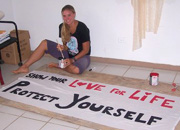FOR IMMEDIATE RELEASE
Monday, July 31, 2006
|
Peace Corps
Contact: Press Office
Phone: 202.692.2230
Fax: 202.692.1379
Email: pressoffice@peacecorps.gov |
|
Peace Corps Volunteer to Raise Awareness of HIV/AIDS One Stride at a Time |
|
From Belize to Oregon, Volunteer Pedals the HIV/AIDS Message Home
When Peace Corps volunteer Bridget Igoe helped the local Rotary chapter start an after-school program in her village, she never imagined the impact it would have on her community during her two years in Belize. Now, as her Peace Corps service comes to a close, this enterprising volunteer has devised a unique way to bring awareness to the devastating realities of HIV/AIDS by pedaling her way back to America.
Considering how much has changed for Bridget since she came to Belize over two years ago, she does not feel ready to immediately jump back into U.S. culture. Instead, she has decided to take her time and “return home in the same way I came to know and love Belize – by bike.” For Bridget, bicycling has had a huge impact on her experience in Belize, allowing her to see the land and meet people she never would have had the opportunity to interact with otherwise.
 By passing through the land rather than over it, Bridget hopes to experience and understand all of the similarities and differences between Belize and the United States. While in Belize, Bridget’s bike allowed her to connect with her community and effectively promote HIV/AIDS education to those in her village and beyond. By passing through the land rather than over it, Bridget hopes to experience and understand all of the similarities and differences between Belize and the United States. While in Belize, Bridget’s bike allowed her to connect with her community and effectively promote HIV/AIDS education to those in her village and beyond.
Bridget’s first assignment in Belize involved working with the Dangriga HIV/AIDS Society, a group operating in her community. After a few months with the organization, Bridget believed more could be done to promote HIV/AIDS prevention education among young people.
“It became my opinion that in Dangriga, effective HIV/AIDS prevention for youth is in behavior change supported through youth enhancement services,” Bridget wrote from Belize. ”These can include summer camps, student mentoring programs, literacy projects, outdoor clubs – none of which directly deal with HIV/AIDS, but all of which focus on expanding a youth’s world and opportunities.”
In an effort to remedy this problem, Bridget began collaborating with the Rotary in May 2005 to develop a youth mentoring program called CASH (Children Active Safe and Happy). Although it was initially created as a temporary after-school program, it was quickly extended into an all-day summer school. The program, open to all students in grades five through seven, provided tutoring and extra-curricular activities such as dance, drama and sports.
In addition to programs benefiting the students, CASH was also involved in regular community service throughout the area such as beach and park clean-ups, making themselves visible while promoting community involvement in CASH activities. After CASH concluded for the summer, Bridget began working as a full-time tutor at Holy Ghost Primary School, the host of CASH.
Belize has the highest rate of HIV/AIDS in all of Central America, and Bridget’s village of Dangriga is one of the hardest hit. By her second year in Belize, AIDS grew from the number one cause of death in Dangriga to the number one cause of death in all of Belize. During her time with the Dangriga HIV/AIDS Society, Bridget gave numerous ”HIV/AIDS 101” presentations at schools, which focused on prevention education and reducing discrimination against people with the disease. Although HIV/AIDS is a major presence in Belize, Bridget believes most people in the States are unaware of how extensive the disease truly is.
“HIV/AIDS is a human pandemic that is at the focus of most international development initiatives,” she said. “But unless you are working in the field, I imagine most people are relatively removed from the virus, considering the extent that it is a health crisis that is truly ravaging some communities in the world.”
Living and working among the people of Dangriga gave Bridget a “broader perspective and understanding of the human condition and society,” she wrote from Belize, “These few years have challenged and shaped my beliefs and values.”
Bridget completes her Peace Corps service in July and will then begin her 4,300 mile journey home to Portland, Oregon. She expects the trip to take about three or four months at which time she will begin looking in to graduate school.
The Peace Corps has sent over 1,600 volunteers to Belize since the program began in 1962. Belize is a nation of diverse cultures located in Central America which is rich in natural beauty and enjoys a wealth of biodiversity. Volunteers focus on a wide variety of projects targeting two main sectors: education and the environment. Working with community councils, volunteers are integrated into the local population working to combat the diverse issues facing the country. Currently, there are 66 Peace Corps volunteers working in Belize. To learn more about Belize, please visit the Where Do Volunteers Go? section.
The Peace Corps is celebrating a 45-year legacy of service at home and abroad, and a 30-year high for volunteers in the field. Since 1961, more than 182,000 volunteers have helped promote a better understanding between Americans and the people of the 138 countries where volunteers have served. Peace Corps volunteers must be U.S. a 27-month commitment.
###
|